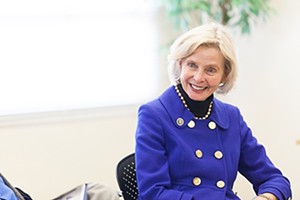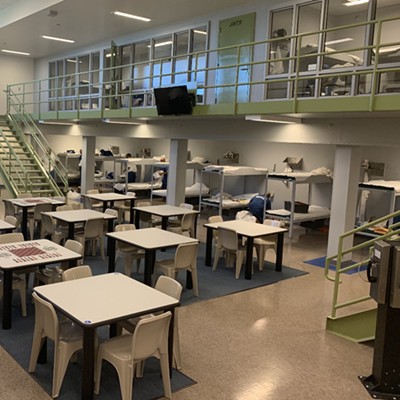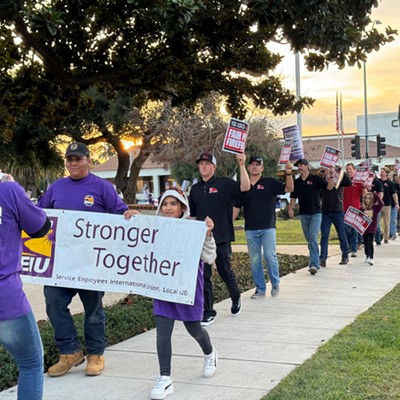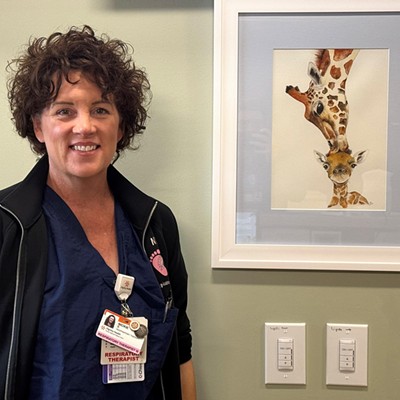Lois Capps (D-Santa Barbara) has represented California’s 24th Congressional District for 18 years. She announced in early 2015 that she’s retiring, setting the stage for a new crop of candidates, who are now campaigning to fill the void.
Capps, 78, was elected in 1997 in a special election following the death of her husband, Walter Capps. She initially signed a pledge to serve no more than three terms in Congress. But she continued to run, winning the election each time. She’s been accused of many things, such as being one of the nicest members of Congress, but also of having out-served her usefulness.

She’s a member of the Committee on Energy and Commerce. She’s advocated for many things, including health care and environmental issues. Among some of her notable accomplishments is having a hand in drafting the landmark—and highly controversial—Affordable Care Act.
On a visit through the Central Coast on Jan. 20, Capps stopped by the Sun’s office to give us the skinny on how she dealt with the rigors of being a congresswoman and what she intends to do during the rest of her term.
Looking back, what would you say stands out as some of your proudest work?
Well first of all, I just want to say this, I still have the rest of the year because the term ends in December 2016. And it’s a short term. When I look back, there are many meaningful things. I voted against the war in Iraq. One of the most significant for me—because I was a school nurse before I was elected to Congress—I kept my RN current until very recently, just because I feel like I wanted to continue working in health care and was fortunate to be on the committee that authorized the Affordable Care Act. That’s probably the signature piece of legislation that I was able to have a part in and able to see my fingerprints in that bill.
What more do you intend to accomplish in the rest of your term?
I do have some unfinished business that I’d like to get done while I’m still there. It’s all in process. Pretty much the whole time I’ve been in, Congress has been split sort of half and half, Republicans and Democrats, so I try to work across the aisle on issues that would appeal to both sides.
For example, one bill that we got passed through the transportation reauthorization just a few weeks ago, was a car rental safety bill that came about as a result of a tragedy on the Central Coast. Two young women living in Ojai were killed because their rental car had a defect that had them recalled, if it had been for sale. But because it was a rental car, they [the women] were able to rent it and lost their lives. Their mom was passionate about doing something about it. We got together and got that included.
I want to pass a pipeline safety reauthorization as we had a spill, an accident with Plains Pipeline on the Gaviota Coast, and it was a tragedy for the wildlife in the area, and an economic impact as well on our area. So that piece is unfinished. There’s a back to nursing, and a reauthorization of Title XIII nursing programs, funding programs like at Allan Hancock College and in Cuesta College that I want to see get passed while I’m in Congress. That’s a bi-partisan effort too.
We have a natural place of beauty called the Piedras Blanca Lighthouse up in San Luis Obispo County. Now, there’s a bill that I’ve attached this to, to make it a national monument—a bill that designates some California coastal monuments to the special interest that people can feature them in the tourism business and historic places.
We work a lot with veterans, quite a few veterans on the Central Coast. We discovered that many of them, hundreds of them, thousands in the country, had their records destroyed in a fire in Missouri. We want to make sure those veterans can find some way we can help them get their benefits, even though they lost their records. That’s a bi-partisan piece of legislation that I want to see get finished too.
Being a public figure for nearly 20 years, how do you handle the criticism from the public?
You have to have thick skin. People are frustrated. We’re seeing the presidential campaign heat up and commentators are seeing how angry the electorate is. You can understand that people get frustrated. You try not to take it personally. Some of it is personal. We have Congressional offices in San Luis Obispo, one here in Santa Maria, and one in Santa Barbara, as well as one in Washington, D.C. All of us try to address the frustrations that people call or email us about and see if there’s a way that we can at least—if we can’t solve it—we can refer them some place where they can get some action.
What do you say to the critics who say that you’ve out-served your usefulness?
They’re entitled to hold the feelings they want to, and my response would be that’s what elections are all about. Particularly in the House of Representatives, I have to get re-certified and or reinstated every two years. That’s often times my name would be on a ballot and there’s always been an alternative that people could vote for. I don’t mean to be smug about it either. I’m very mindful that, for some people, I have out-lived my usefulness. We pay a lot of attention in our office, through our website, through answering letters, and phone calls and so forth, to how people feel about things.
Why did you stay in Congress for a lot longer than you expected to?
This goes back in history. I’ve never run for any public office before. My husband taught school, he taught at UCSB, and he didn’t teach political science either. He wasn’t a traditional candidate either, but he did get elected in 1996. After he died suddenly, nobody would run because it had been a really close election. It was what they call a swing district—it wasn’t either really Democratic or Republican. So I ran and I was elected. It was kind of a surprise and it was a close election. That was in 1997 and I took office in 1998. I didn’t know when I was first elected if I would make it through a term, then somebody else would step in and get elected. But I did. Then you start learning how to do the job.
What are some of the issues in the 24th District that urgently need to be resolved?
Bottom line, always jobs. The recession is close enough on our heels. It affected your neighbors and friends, and maybe some family members. Jobs are always front and center.
What was your most rewarding experience as a nurse?
I’ve had a lot of tragedies and heartbreaks, but a lot of rewarding days. For a part of my job for a while, I worked with teenagers who become parents. There’s a program whereby they could stay on a comprehensive high school campus and not have to go to an alternative school. We had several that went on to a four-year college and we wanted them to have every advantage another parent would have. There’s a stigma if you get pregnant early. A lot of them became very good parents and I see their kids now grown up, that’s how long ago that was. And they’re productive and leading really good lives. If their parents had dropped out and not ever completed their education, the chances would be tougher for them.
What are you plans after 2016?
I want to watch my teenage grandson play sports and stuff, enjoy my family. And stay active. I’d like to plant a garden and get a little puppy dog. I go back and forth between coasts, so those things are kind of out of reach for me.
Does the grind of being a congresswoman ever wear you down?
Oh every job has that. I’ll tell you what has changed probably the most, in terms of the grind part of it, is airline travel. Having the planes fly on time is a big plus. They’re crowded and that’s the way it is for everybody.
The Washingtonian magazine regarded you as the “nicest” person in Congress, but who do you think is the meanest member of Congress?
That’s very tongue-and-cheek, that’s very insider. At the time they wrote the story, the Bakersfield area was represented by Bill Thomas. He was actually quite a leader for the other party. He was very prickly. He was not known for being nice. When The Tribune ran the story about the designation that the Washingtonian put out, they listed him as the meanest and me as the nicest. They asked who brings home the bacon more—him or her? He had been in Congress a long time and I was fairly new, and he definitely brought home more perks for his community than I did. It wasn’t written up as a compliment in the San Luis Obispo paper.
Did you incorporate any sentiment of that into your style?
I never set out to be either mean or nice. But honey attracts more flies than vinegar. Why not get along with people and build rather than elbow your way? It’s a matter of style. I wouldn’t want to change my stripes just because I was in a certain position. If I couldn’t be the way I was raised, it would feel awkward. It wouldn’t feel comfortable.
Staff Writer David Minsky can be reached at [email protected].









